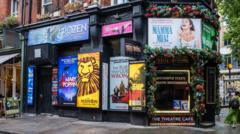London's Cultural Scene Recovers from Covid Lockdown

- London's cultural scene was severely impacted by the Covid lockdown.
- Theatre productions resumed, and audiences returned in numbers, surpassing pre-pandemic levels by 2022.
- The creative industries generate £50 billion annually for London's economy.
- City Hall is investing £10 million to aid the sector's recovery.
- The nightlife industry faces a 'cost of operating crisis' due to rising costs.
Introduction to the Crisis
London's cultural scene was among the hardest hit during the Covid lockdown. The first lockdown in March 2020 saw the curtains go down on all West End productions, leaving many workers, especially those on freelance contracts, facing uncertainty.
Theatre producer Eleanor Lloyd described the situation as 'horrendous' due to the unpredictability of the lockdown's duration. Her business, which had been running successfully for a year and a half, saw its income drop to zero.
Adaptation and Resilience
Some individuals in the sector found alternative sources of income. For example, actor Serene Sabah opened an ice cream parlour. Despite the challenges, theatre-goers returned relatively quickly, with numbers exceeding pre-pandemic levels by 2022, according to the Creative Industries Council.
The creative industries generate £50 billion annually for London's economy, and the lockdowns had significant knock-on effects across the city. Justine Simons, City Hall's deputy mayor for culture, noted that the industry suffered from 'long-Covid,' with many businesses taking on debt and experiencing job losses.
Support and Recovery Efforts
City Hall is investing £10 million to boost the sector and aid its recovery. However, Michael Kill, the chief executive of the Night Time Industries Association (NITA), believes that the nightlife industry has not been given a chance to recover, facing a 'cost of operating crisis' due to rising costs such as energy and national insurance contributions.
In contrast, Barth Rougier, the owner of a recently opened venue in Kensington, is more optimistic, citing a 'positive culture shift' where people are seeking more socializing spaces. He emphasizes the need for collective responsibility to 'shine a light' on cultural and socializing spaces.